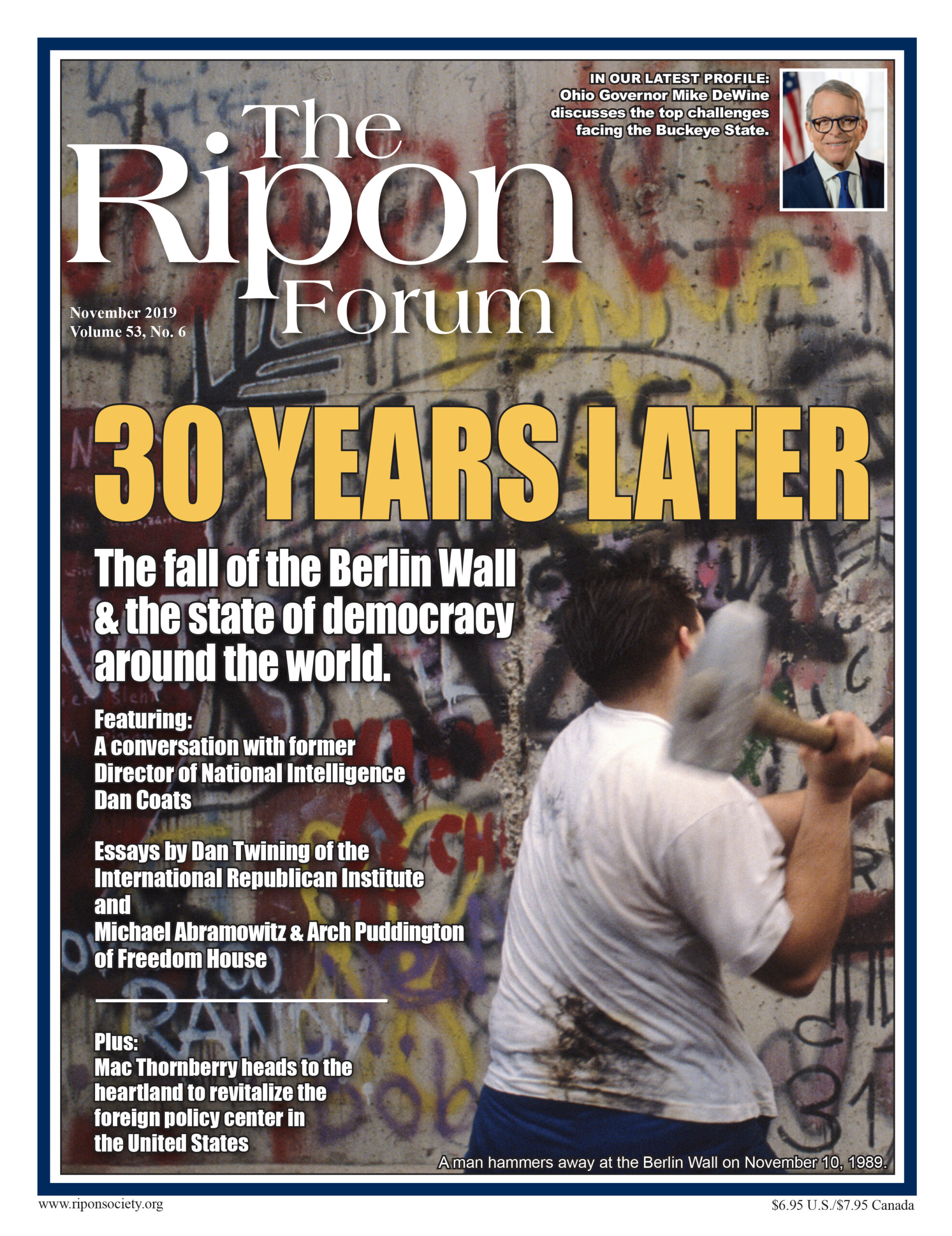In Latest Ripon Forum, Former Intelligence Director Dan Coats and Others Look at Fall of the Berlin Wall & State of Democracy Around the World Today

WASHINGTON, DC – The Ripon Forum marks the anniversary of the fall of the Berlin Wall 30 years ago this month with an edition that not only looks back at this historic event, but examines the state of democracy around the world today.
Leading the Forum’s coverage is a conversation with former Director of National Intelligence Dan Coats, who shares his thoughts on America’s involvement in bringing down the Wall, and how a foreign policy that promoted the American example compares to a policy that promotes America first.
“I believe this is something of a false dichotomy,” Coats states. “The old ‘America First’ once attached to pre-war isolationism has led many to misinterpret the concept now relevant to the modern world. Isolationism was rejected back then as an irresponsible dream. Since then, American foreign policy has always been centered on American national interests, but as properly defined and accurately understood.
“Our core national interests — peace, prosperity, security — have always included nurturing everywhere our core values. Extending benefits of freedom, democracy, human rights, and free enterprise to others has always served our national interests. This is the real ‘America First.’”
Coats, who served as U.S. Ambassador to Germany from 2001 to 2005, also shares his thoughts on the American most responsible for the collapse of communism after the fall of the Wall (hint: it’s not Ronald Reagan.)
This edition of the Forum also features two essays examining the challenges facing America and other democracies around the world. In the first essay, Freedom House President Michael Abramowitz and distinguished fellow Arch Puddington look at “The State of Freedom Three Decades After the Fall,” and the fact that “for the last 13 years, more countries have experienced declines in freedom than advances” – the longest period of democratic regression since Freedom House started tracking this standard in 1973.
In the other essay, entitled, “Democracy, Dictatorship, and American National Security in the 21st Century,” International Republican Institute President Dan Twining warns that, “The greatest dangers to America emanate from the ideologically driven strategies of Russia and China to weaken our democracy.” Twining adds: “In Europe and beyond, the Putin regime is deploying a sophisticated information warfare campaign to undermine democratic institutions, exploit societal divisions, and erode citizens’ confidence in democracy.”
In a piece entitled, “The Wall has Fallen, but Divisions Remain,” Professor Klaus Schroeder of the Free University Berlin writes about the divide that continues to exist between East and West Germans nearly three decades after unification. Also writing about this historic moment is Professor Jeffrey Engel of Southern Methodist University, who, in an essay entitled, “The Virtue of Quiet at the Cold War’s End,” looks back at how President George H.W. Bush managed the fall of the Wall, writing that America’s 41st President “did more than anyone else to give peace the calm and quiet it needed to grow.”
And at a time when America’s role in the world is being questioned by many, attorney and former intelligence officer Matthew F. Ferraro looks at the series of “Heartland Speeches” on national security that U.S. Rep. Mac Thornberry (TX-13) has been delivering around the country. “Before chambers of commerce and civic groups in cities from Aspen to Memphis,” Ferraro writes, “Thornberry has made the argument that the quality of life of most Americans is better thanks to the American-led, seven-decades old international system.”
Other authors and op-eds featured in this latest edition of The Ripon Forum include:
- U.S. Rep. Greg Walden (OR-2) – writing about the actions that Congress has taken to combat the nation’s opioid crisis and “The Next Step in the Fight.”
- Lindsey Burke of The Heritage Foundation – writing about the D.C. Opportunity Scholarship Program and why it is “A Beacon of Hope in the Nation’s Capital.”
- Peter Kellner, a visiting scholar at Carnegie Europe – writing about “Brexit and the Special Relationship.”
- Forum Deputy Editor Kyle Chance and Editorial Intern Sarah Pearce – taking one more look at the fall of the Berlin Wall and its meaning today, arguing that for many young Americans, “It’s just another page in the history books.”
- Forum Editor Lou Zickar – writing about “The Fury of an Aroused Democracy and the False Furies of Today,” and the need to confront the many challenges we face at a time when outrage culture is gripping the United States.
And in the latest Ripon Profile, Mike DeWine discusses his job as Governor of Ohio and some of the top challenges facing the Buckeye State.
The Ripon Forum is published six times a year by The Ripon Society, a public policy organization that was founded in 1962 and takes its name from the town where the Republican Party was born in 1854 – Ripon, Wisconsin. One of the main goals of The Ripon Society is to promote the ideas and principles that have made America great and contributed to the GOP’s success. These ideas include keeping our nation secure, keeping taxes low and having a federal government that is smaller, smarter and more accountable to the people.



